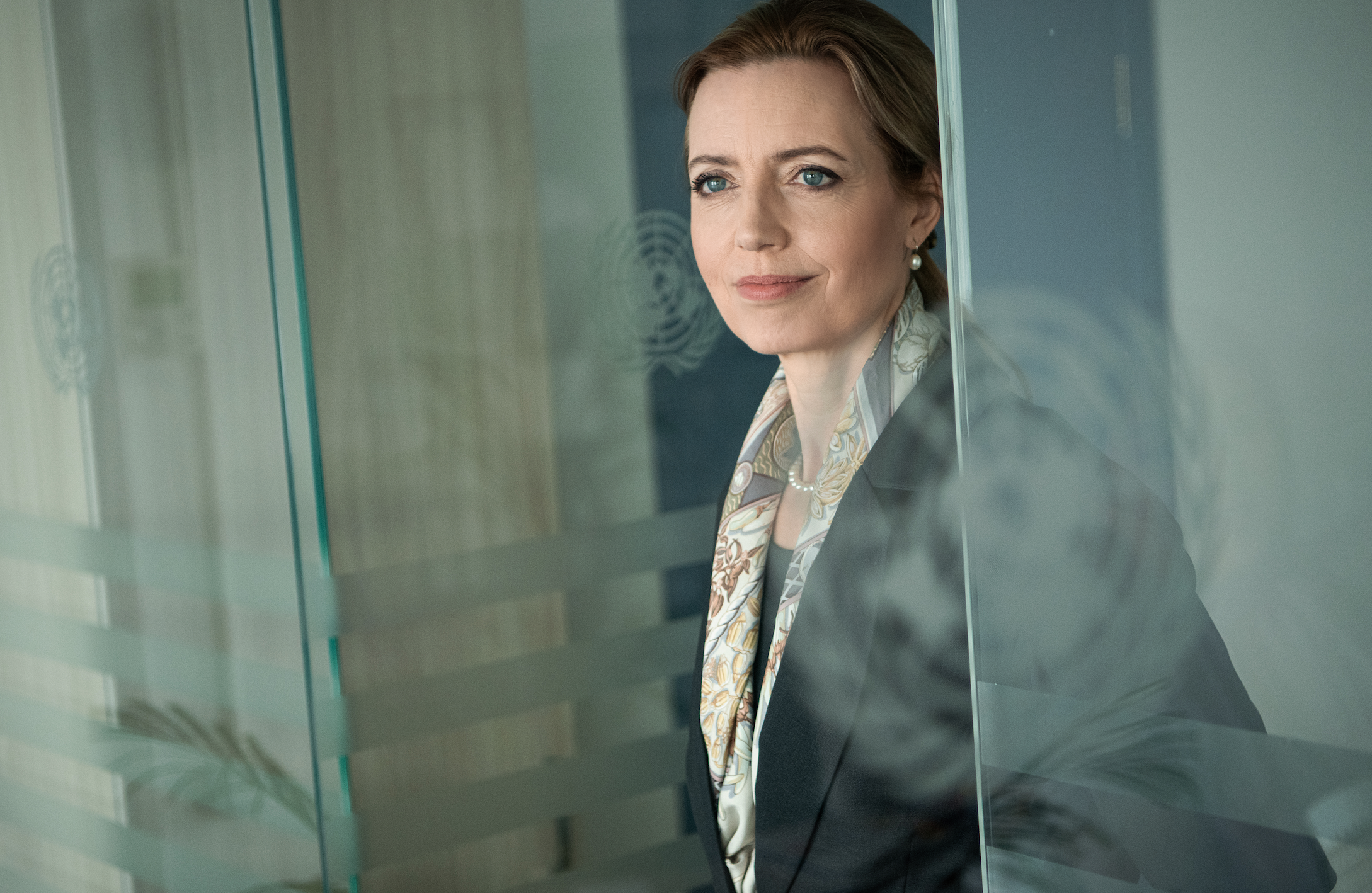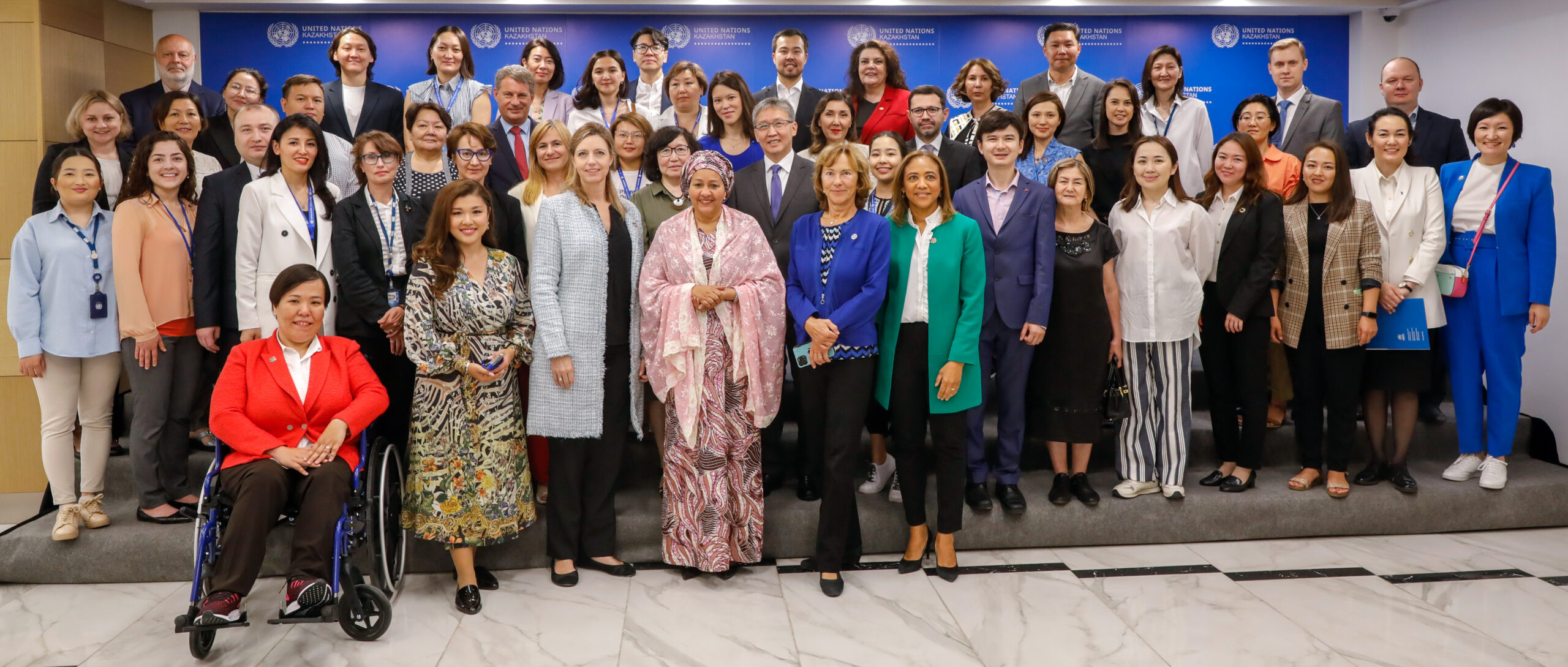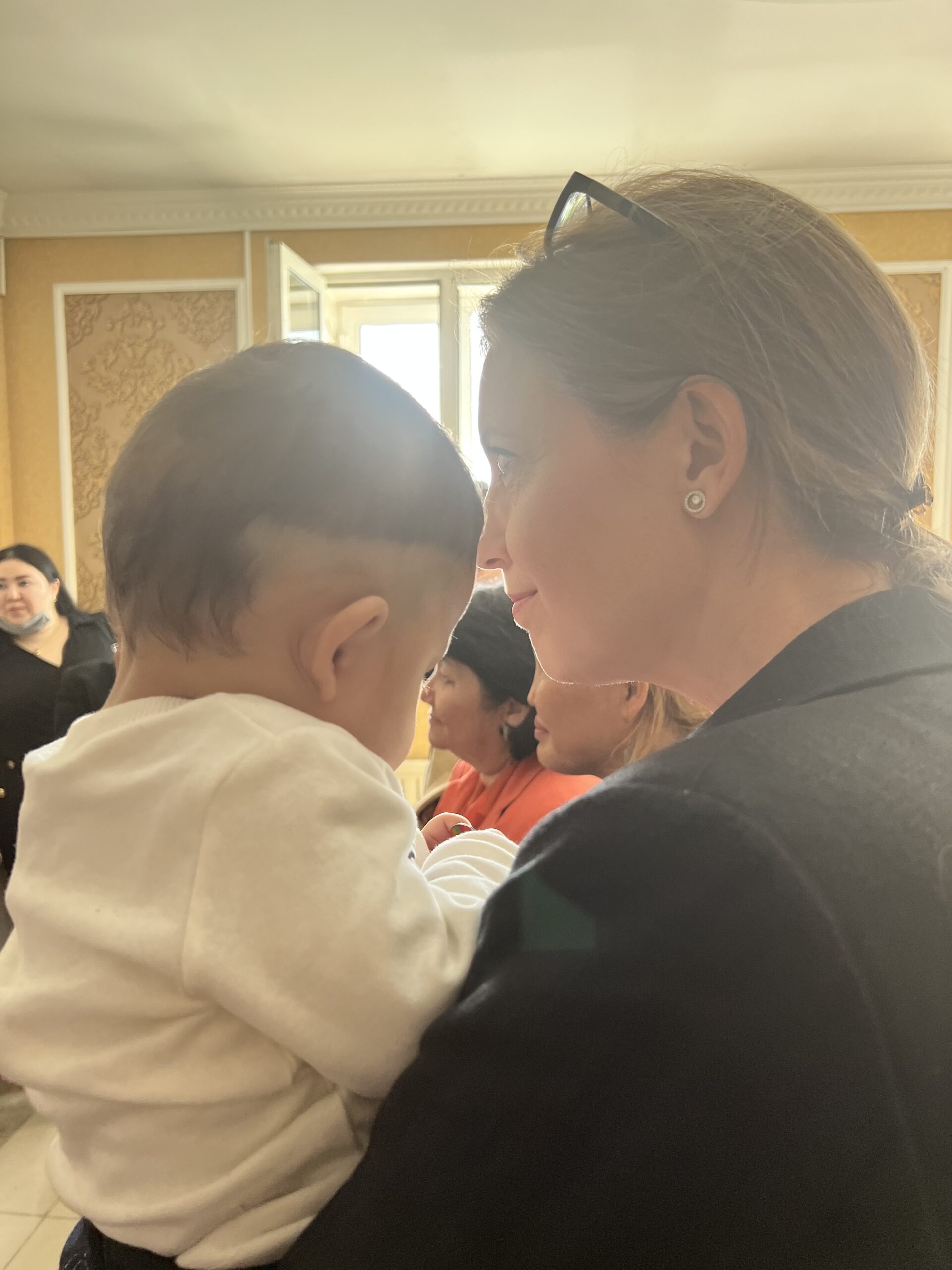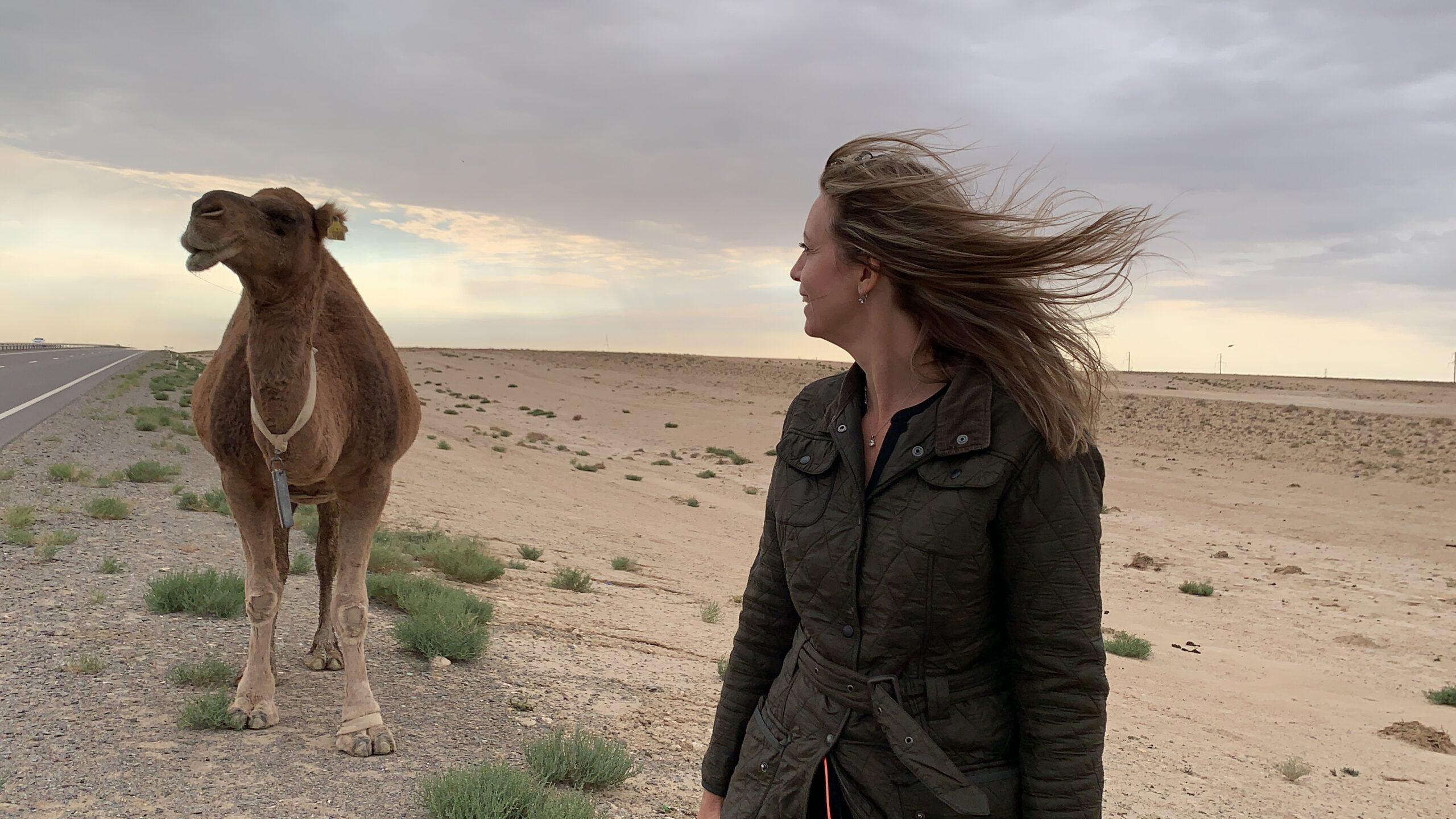ASTANA – Twenty-seven agencies, 380 staff members, and a firm commitment to ensure every woman, man, girl, and boy are not left behind on a developmental journey. That is how one can describe the work of the United Nations (UN) office in Kazakhstan, which celebrates 30 years on Feb. 16. Michaela Friberg-Storey, UN Resident Coordinator for Kazakhstan, spoke with The Astana Times on a range of UN activities in Kazakhstan, the nation’s sustainable development efforts and role on the international arena.

Michaela Friberg-Storey began her mission in Kazakhstan in November 2020, bringing over 20 years of experience working with peace, security and development to this position. Photo credit: UN Office in Kazakhstan.
Kazakhstan became a full member of the UN at the plenary session of the UN General Assembly on March 2, 1992. Almost one year later, on Feb. 16, 1993, the first office of the UN was opened in the Kazakhstan hotel in Almaty, with the first Permanent Representative Neugel Ringrose.
Q: As Kazakhstan and the UN mark 31 years of cooperation and the work of the UN office in the country celebrates 30 years, how did the work of the UN in Kazakhstan evolve over these years?
A: Three decades ago, on Feb. 16, 1993, the initial UN office was established in Kazakhstan, with the primary focus at the time being to provide aid to address the country’s immediate requirements, including humanitarian support. Over time, the UN Country Team in Kazakhstan has shifted from being solely a foreign aid provider to a partner working alongside Kazakhstan to address ongoing development challenges and promote a more prosperous society.
Our aim is to ensure and support that every woman, man, girl and boy are part of the development journey which Kazakhstan is undertaking. As the UN, we focus on the most vulnerable persons.
One of the major changes we have seen is an increased emphasis on partnerships and collaboration with various stakeholders, including the government, civil society organizations, and the private sector. This has allowed us to better align our efforts with the country’s development priorities and to have a greater impact on the ground.
In addition, the use of technology and innovative approaches have become increasingly important in our work, enabling us to reach more people and have a greater impact in a more efficient and effective manner.
UN in Kazakhstan activities have come a long way in the past three decades and we are proud of the progress we have made in supporting the country’s development. We look forward to continuing our cooperation with Kazakhstan in the years to come.

UN country team poses for a group photo with UN Deputy Secretary-General Amina Mohammed during her visit to Kazakhstan. Photo credit: UN Office in Kazakhstan.
Q: What priorities do you set moving forward?
A: Our top priority is to support the country in achieving its development goals and advancing toward a more sustainable and equitable future for all its citizens.
As a UN official in Kazakhstan, I had the opportunity to travel across the country and meet a diverse range of people. One of the memorable encounters was with a goat herder I met in Mangystau. Despite the language barrier, we were able to communicate through gestures and smiles, and he proudly showed me his herd of goats. I was struck by his connection to the land and his simple way of life, which stood in stark contrast to the bustling city life that is also part of Kazakhstan. This is also why we, the UN, and the government are focusing on inequalities. Our top priority is that no one is left behind– but that all of Kazakhstan moves forward together.
In the coming years, we will focus on three key areas. First, we will focus on empowering people with knowledge and skills that are needed for the future – and for exercising human rights.
Secondly, we will focus on strengthening institutions in their governance and respect for human rights, as they build the future for the country.
Thirdly – we will support sustainable economic growth and address challenges posed by climate change.
When we engage in these areas of work, we always do it with a special focus on women and girls. It is essential to include women and girls in the advancement of the country as otherwise, the country is not making use of its full capacity. And women and girls run the risk of being left behind.
These are our priorities and we will work closely with the government of Kazakhstan, civil society organizations, the private sector, and other partners to achieve these goals. We believe that by working together, we can build a better future for the people of Kazakhstan.

Friberg-Storey visits a shelter for domestic violence victims in Turkistan. Photo credit: UN Office in Kazakhstan.
Q: How would you evaluate Kazakhstan’s sustainable efforts?
A: Kazakhstan has made significant efforts towards sustainable development in recent years, and we have seen progress in several key areas.
Firstly, the government has shown strong leadership in addressing the challenges posed by climate change, including through the development of renewable energy sources and the implementation of energy-efficient technologies. Moreover, we welcome the recently adopted carbon neutrality strategy. This will reduce the country’s carbon footprint and position Kazakhstan as a leader in the region in terms of sustainable energy.
Secondly, Kazakhstan has made important investments in education and healthcare, which are critical for promoting human capital and ensuring that the country’s citizens have the skills and knowledge they need to succeed in the modern world.
Finally, the government has also taken steps to promote gender equality and women’s empowerment, including through the adoption of progressive laws and policies and the implementation of programs aimed at improving the status of women in society. For example, last year, the ban on 191 professions for women was lifted.
I would say that Kazakhstan is making steady progress towards sustainability and that the government’s commitment to this issue is commendable.
Shifting from fossil fuels will not be easy, but new green jobs will be created. There is still much work to be done, and we look forward to continuing to support Kazakhstan in its efforts to build a more sustainable and equitable future.
Q: In the context of the UN Sustainable Development Cooperation Framework with Kazakhstan, what are Kazakhstan’s real chances to achieve inclusive economic growth?
A: I believe that Kazakhstan has strong chances to achieve inclusive economic growth. This is due to several key factors. Kazakhstan has a dynamic economy, with significant natural resources and a growing private sector. The government has shown a commitment to implementing reforms that support the development of small and medium-sized enterprises, which are critical for creating job opportunities and reducing poverty. And the country has a highly educated and skilled workforce, which will be critical for supporting the development of new industries and promoting innovation.
Agriculture, retail industries, and digitalization are all areas that can be both expanded and sustainable to stimulate economic growth. But it requires investment. Green investment in supporting infrastructure enhanced connectivity. I also want to add that by preserving nature and biodiversity, the prospect of sustainable eco-tourism is another aspect to bring forward. Kazakhstan is unique, vast, and beautiful.

Friberg-Storey during her visit to Mangystau. Photo credit: UN Office in Kazakhstan.
Q: Environmental sustainability has been a priority for the Kazakh government. How can Kazakhstan balance its environmental targets, such as carbon neutrality by 2060, and ambitious industrial goals?
A: Balancing environmental sustainability and ambitious industrial goals is a challenge that many countries are facing, and Kazakhstan is no exception. However, I believe it is possible to achieve both through a combination of measures.
It is important to promote the development of alternative energy sources, such as wind, solar, and hydropower, which will help to reduce the country’s dependence on fossil fuels. This can be achieved through investment in research and development, as well as through the creation of enabling policies and regulations.
It is essential to promote energy efficiency and to implement measures that reduce carbon emissions, such as the use of clean technologies in industry and transportation.
It is crucial to invest in sustainable infrastructure, such as public transportation and low-carbon buildings, which will help to reduce the carbon footprint of the country as a whole.
Finally, it is important to engage with all stakeholders to raise awareness about the importance of environmental sustainability and to build a shared commitment to achieving carbon neutrality.
Every person in Kazakhstan will need to contribute by living more sustainably and making smart choices. We need to increase the dialogue with all citizens and make sure that green choices are available for people to make without it having to cost more for those who have the least. Let me say that this is not just for Kazakhstan. This is what we must do all over the world.
Q: What is Kazakhstan’s current role in the international arena?
A: Kazakhstan has made significant strides in recent years to establish itself as a key player in the international arena. The country has shown strong leadership in promoting regional cooperation and stability in Central Asia and has worked to build bridges between different countries and cultures. Kazakhstan is firmly anchored in the UN Charter.
Kazakhstan is an active participant in the international arena, such as UN, OSCE, SCO, and CICA, and is playing a constructive role in addressing global challenges, including international peacekeeping and peacebuilding efforts, efforts on nuclear disarmament and non-proliferation. Kazakhstan is making a positive and influential contribution to the international arena, and its role as a bridge-builder and peacemaker is increasingly being recognized and appreciated.
Kazakhstan’s support to the survivors of the devastating earthquake in Türkiye and Syria earlier this month is a recent example of how the country is contributing to international peace and stability.
Q: Regarding the UN work in Kazakhstan, how represented are Kazakh specialists in the UN system, both here in Kazakhstan and abroad?
A: The UN values the contributions of local staff and works to ensure that they are well-represented in its operations. Currently, the UN Country Team in Kazakhstan consists of 380 staff members, out of which 331 are national officers.
In Kazakhstan, the UN has made a concerted effort to hire national staff and to promote their professional development. Many Kazakhstani nationals are now serving in key positions within the UN system. This not only helps to build local capacity and expertise but also ensures that the UN’s work is grounded in the local context and is more effective and responsive to local needs.
Abroad, Kazakh specialists are also increasingly being recruited to work in the UN system and are making important contributions to its work in a wide range of areas, from peacekeeping and peacebuilding to sustainable development and humanitarian assistance.

The UN Day was celebrated with the premiere of the “Leila’s Prayer” performance by Central Asia’s first inclusive theater, “Qanattylar.” Photo credit: UN Office in Kazakhstan.
Q: It has been a little over two years since you began your mission in Kazakhstan. What are the three words that best describe Kazakhstan?
A: Since I landed in Kazakhstan, I’ve been blown away by everything here. The people, the nature, and the cultural heritage are simply amazing. If I had to sum up the country in three words, I would say – Dynamic, Inclusive, and Forward-looking.
Dynamic – Kazakhstan is a rapidly developing country that is undergoing significant changes, both economically and socially. It is a place of great energy and momentum, and I have been impressed by the speed and scale of its transformation.
Inclusive – Kazakhstan has a rich cultural heritage and a diverse population, and the government has made a strong commitment to promoting tolerance and inclusiveness. The country is home to many different ethnic and religious communities, and I have been impressed by the spirit of cooperation and mutual respect that I have seen here.
Forward-looking – Kazakhstan is a country that is focused on the future. The government is committed to sustainable development and is taking a proactive approach to address the challenges of the XXI century – both in Kazakhstan and beyond.
Overall, my time in Kazakhstan is a humbling and eye-opening experience. It reinforced the importance of the UN’s work in promoting human rights, peace, and development and highlighted the resilience and kindness of the people I met.
Q: What events does the UN office plan to mark the 30th anniversary?
A: To mark the 30th anniversary of the UN Office in Kazakhstan, we have planned a series of events that will celebrate the achievements of the UN system in the country and look ahead to the future. Some of the key events include a conference to mark the 30th anniversary, which will bring together government officials, UN staff, and representatives of civil society. Special media campaign entitled “UN & Me” to highlight the key achievements of the UN through the perspective of the local beneficiaries and other various outreach and engagement activities aimed at raising awareness of the UN and its work.
We believe that they will provide an important opportunity to celebrate the achievements of the UN system in the country and to look ahead to the future.

